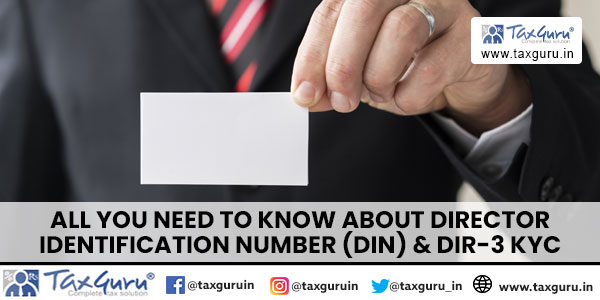Understanding Director Identification Number (DIN) and DIR-3 KYC is essential for individuals aiming to become directors in companies, whether new or existing. This guide covers the application process, required documents, digital signatures, fee payment, and updates.
Any person intending to become a director in a new Company is required to apply for the allotment of Director Identification Number only through SPICe eform at the time of incorporation.
And on the other hand any person intending to become a director in an existing company shall have to make an application in E-Form DIR-3 for allotment of DIN.
Supporting documents for DIR-3:
- Attach the photograph
- scanned copy of proof of identity
- scanned copy of proof of residence
- board resolution proposing his appointment as director in an existing company
Note: Email Id and Mobile No also required.
Digital Signature:
- Obtain a Digital Signature,
- Form DIR-3 is mandatory to be signed by the Applicant and shall be verified digitally by Company Secretary in full time employment of the company/Managing Director/Director/CEO/CFO of the existing company in which the applicant is intended to be appointed as a director.

Fee Payment:
Upon upload, make the payment of filing fee of E-Form DIR-3 of INR 500 or an amount prescribed by MCA.
The user is required to get him/her registered on the MCA Portal to obtain Login ID and then login to the MCA portal.
After DIR-3 now we should understand about the DIR-3 KYC
We should understand the concept of DIR-3 KYC, every person holding a DIN shall update his KYC details annually.
Further, any DIN holder who wants to update any information of his KYC details must update the same through filing of eForm DIR-3 KYC only and also after allotment of DIN
For Financial Year 2024-25: Any person who has been allotted “Director Identification Number (DIN)” on or before 31st March 2024 and the status of such DIN is ‘Approved’, needs to file form DIR-3 KYC to update KYC details in the system on or before 30th September 2024, and if DIN allotted after 31st March 2024 then DIR-3 KYC shall be filed in next financial year that is on or before 30th September 2025.
There are two types of e-Form DIR-3 KYC, which are as follows:
- DIR-3 KYC: Any director who is filing e-Form DIR-3 KYC for the first time after allotment of DIN or whose details are required to be updated/changed must file this form.
- DIR-3 KYC WEB: Any director who has already filed the e-Form DIR-3 KYC/DIR-3 KYC (Web) in the previous year.
Important Checkpoints
- If the DIN holder does not file his annual KYC within the due date of each financial year, such DIN shall be marked as ‘Deactivated due to non-filing of DIR-3 KYC’ and shall remain in such deactivated status until KYC is done with a fee of INR 5000.
- It is mandatory to enter your personal mobile number and personal email ID in the form DIR-3 KYC and the same has to be verified by an OTP process. Further, the mobile number and email ID must be unique such that it is not already linked with some other person in the DIN holders’ database.
- All information as entered in the form DIR-3 KYC shall be updated in the DIN holders’ database.
- In case the DIN holder is a resident of India, the address must be an address in India and mobile number must be an Indian mobile number. In case DIN holder is non-resident, foreign address and foreign number shall only be allowed.
- Please note that, once OTP is successfully sent to the valid mobile number and email ID entered in the form, ‘Send OTP’ button gets disabled. OTP is valid for 30 minutes.
Supporting documents for DIR-3 KYC:
- Proof of Permanent Address
- Proof of Identity
- Proof of Present Address.
Conclusion: Director Identification Number (DIN) and DIR-3 KYC processes play crucial roles in regulating directorship in companies. Annual updates ensure accurate information and compliance with regulatory requirements. Understanding these processes is vital for individuals intending to hold director positions.




